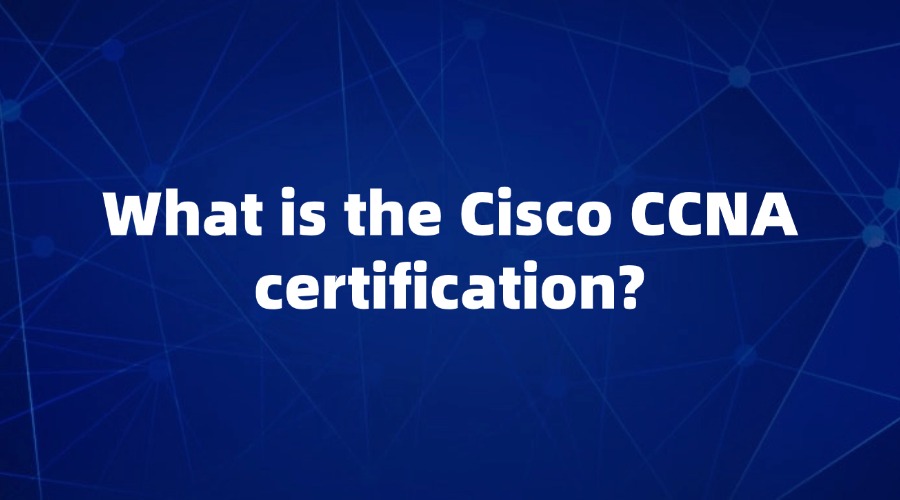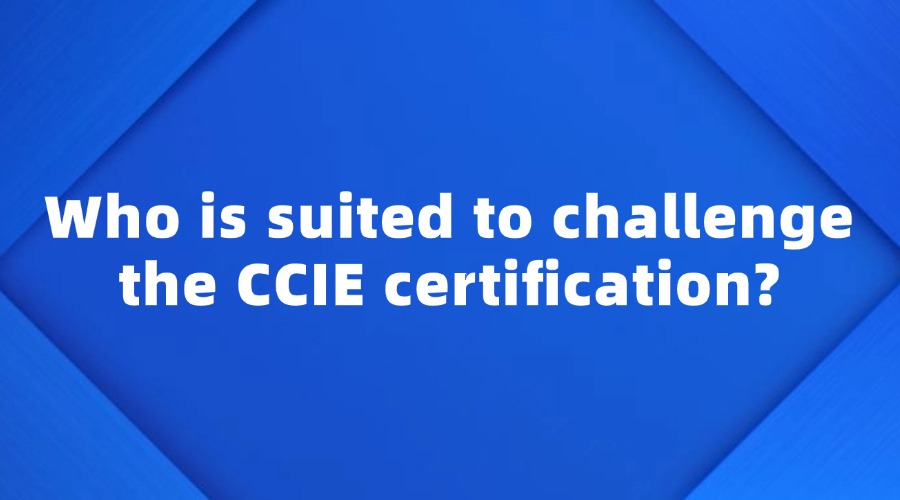What are the requirements for taking Cisco certification exams?
Update time:2024-11-26
Cisco certification is a well-known certification system in the field of network engineering, covering different levels from beginner to advanced. Whether you are just starting out or have extensive experience, Cisco certification can provide you with a clear career development path. However, there are some basic conditions you need to meet to take the Cisco certification exams.

1. Basic Knowledge
First of all, regardless of which level of Cisco certification you are applying for, a foundational knowledge of networking is essential. For instance, you should understand basic network concepts, including IP addresses, subnet masks, routers, and switches. This knowledge will be used throughout your learning and exams. Therefore, if you are a complete beginner, it is advisable to start with some basic networking courses or read introductory books.
For CCNA (Cisco Certified Network Associate), although it does not require extensive networking knowledge, you should at least understand basic network operations. CCNP (Cisco Certified Network Professional) requires a deeper understanding of networking. As for CCIE (Cisco Certified Internetwork Expert), the highest level of certification, it demands a profound understanding of network architecture and complex network issues.
2. Practical Work Experience
Having practical network work experience can significantly benefit you when applying for Cisco certification. Especially for advanced certifications like CCNP and CCIE, many of the exam questions relate to real-world scenarios you will encounter in the workplace. If you have work experience, you will find it easier to grasp complex concepts and problems during your study and preparation.
However, this does not mean that you cannot pursue Cisco certification without work experience. Beginners can start with CCNA, and the learning process will also help you accumulate practical experience. If you have already worked with network equipment and technologies, pursuing these certifications will be more manageable.
3. Time and Effort Investment
Preparing for Cisco certification exams requires a significant investment of time and effort. For example, CCNA, being an entry-level certification, still requires time to study networking fundamentals and configuration skills. CCNP and CCIE require more extended study periods due to their complexity and higher difficulty. Typically, preparing for CCNA may take a few months, while CCNP and CCIE might require a year or more.
In addition to study time, you also need to invest effort in doing labs, practicing questions, and watching video tutorials. Especially for the CCIE lab exam, you will need to practice extensively and simulate real scenarios to ensure you perform well during the exam.
Contact me immediately to get the golden key helping you fast express your certificate. 4. Financial Budget
Financial considerations are also important when applying for Cisco certification. The costs vary by certification level; CCNA exams are relatively inexpensive, typically around a few hundred dollars. CCNP and CCIE exams are more costly, with the CCIE lab exam expenses, including study materials and lab equipment, potentially exceeding a thousand dollars or more.
If you self-study, you might save some costs, but you will still need to purchase relevant learning resources, such as official textbooks, lab manuals, and online courses.
5. Exam Strategy and Psychological Preparation
In addition to studying and experience, having a good exam strategy is essential. Cisco certification exams cover a lot of content and feature complex question types, with some questions having traps. Therefore, practice exams before the test are crucial to familiarize yourself with question types and the exam process. Additionally, maintaining good psychological resilience is important—don't panic during the exam, and if you encounter difficult questions, focus on the ones you can answer first.
The preparation process can be challenging, especially for those already working with limited study time and high pressure. Thus, maintaining a positive mindset, developing a reasonable study plan, and being persistent in your studies are key to passing the exams.
Summary
In summary, applying for Cisco certification requires a certain level of networking knowledge, and having practical work experience is beneficial, though it can be compensated for through diligent study. Preparing for the exam requires an investment of time, effort, and money, along with a good exam strategy and psychological preparation. Although Cisco certification is challenging, it can greatly aid your career development. If you aim to achieve greater accomplishments in the field of network engineering, Cisco certification is definitely worth your effort.
I hope this article helps you better understand the requirements for Cisco certification and provides some reference for your career planning. Good luck!
I'm your man who have the 100% valid dumps , buy it now for 50% off to clear your exam!
Click it ↓↓

1. Basic Knowledge
First of all, regardless of which level of Cisco certification you are applying for, a foundational knowledge of networking is essential. For instance, you should understand basic network concepts, including IP addresses, subnet masks, routers, and switches. This knowledge will be used throughout your learning and exams. Therefore, if you are a complete beginner, it is advisable to start with some basic networking courses or read introductory books.
For CCNA (Cisco Certified Network Associate), although it does not require extensive networking knowledge, you should at least understand basic network operations. CCNP (Cisco Certified Network Professional) requires a deeper understanding of networking. As for CCIE (Cisco Certified Internetwork Expert), the highest level of certification, it demands a profound understanding of network architecture and complex network issues.
2. Practical Work Experience
Having practical network work experience can significantly benefit you when applying for Cisco certification. Especially for advanced certifications like CCNP and CCIE, many of the exam questions relate to real-world scenarios you will encounter in the workplace. If you have work experience, you will find it easier to grasp complex concepts and problems during your study and preparation.
However, this does not mean that you cannot pursue Cisco certification without work experience. Beginners can start with CCNA, and the learning process will also help you accumulate practical experience. If you have already worked with network equipment and technologies, pursuing these certifications will be more manageable.
3. Time and Effort Investment
Preparing for Cisco certification exams requires a significant investment of time and effort. For example, CCNA, being an entry-level certification, still requires time to study networking fundamentals and configuration skills. CCNP and CCIE require more extended study periods due to their complexity and higher difficulty. Typically, preparing for CCNA may take a few months, while CCNP and CCIE might require a year or more.
In addition to study time, you also need to invest effort in doing labs, practicing questions, and watching video tutorials. Especially for the CCIE lab exam, you will need to practice extensively and simulate real scenarios to ensure you perform well during the exam.
Contact me immediately to get the golden key helping you fast express your certificate. 4. Financial Budget
Financial considerations are also important when applying for Cisco certification. The costs vary by certification level; CCNA exams are relatively inexpensive, typically around a few hundred dollars. CCNP and CCIE exams are more costly, with the CCIE lab exam expenses, including study materials and lab equipment, potentially exceeding a thousand dollars or more.
If you self-study, you might save some costs, but you will still need to purchase relevant learning resources, such as official textbooks, lab manuals, and online courses.
5. Exam Strategy and Psychological Preparation
In addition to studying and experience, having a good exam strategy is essential. Cisco certification exams cover a lot of content and feature complex question types, with some questions having traps. Therefore, practice exams before the test are crucial to familiarize yourself with question types and the exam process. Additionally, maintaining good psychological resilience is important—don't panic during the exam, and if you encounter difficult questions, focus on the ones you can answer first.
The preparation process can be challenging, especially for those already working with limited study time and high pressure. Thus, maintaining a positive mindset, developing a reasonable study plan, and being persistent in your studies are key to passing the exams.
Summary
In summary, applying for Cisco certification requires a certain level of networking knowledge, and having practical work experience is beneficial, though it can be compensated for through diligent study. Preparing for the exam requires an investment of time, effort, and money, along with a good exam strategy and psychological preparation. Although Cisco certification is challenging, it can greatly aid your career development. If you aim to achieve greater accomplishments in the field of network engineering, Cisco certification is definitely worth your effort.
I hope this article helps you better understand the requirements for Cisco certification and provides some reference for your career planning. Good luck!
I'm your man who have the 100% valid dumps , buy it now for 50% off to clear your exam!
Click it ↓↓
Hot article














